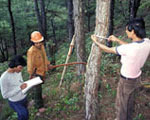24 September 2008: UN Secretary-General Ban Ki-moon has announced the launch of the United Nations’ Reduced Emissions from Deforestation and Forest Degradation (REDD) Programme, which aims to combat climate change through creating incentives to reverse deforestation trends.
The programme aims to tip the fiscal balance in favor of sustainable forest management and thereby simultaneously bringing […]
 24 September 2008: UN Secretary-General Ban Ki-moon has
24 September 2008: UN Secretary-General Ban Ki-moon has
announced the launch of the United Nations’ Reduced Emissions from
Deforestation and Forest Degradation (REDD) Programme, which aims to combat
climate change through creating incentives to reverse deforestation trends.
The
programme aims to tip the fiscal balance in favor of sustainable forest
management and thereby simultaneously bringing economic benefits to
participating countries and contributing to significant reductions in
greenhouse gas emissions. The REDD Programme will be coordinated by the Food
and Agriculture Organization of the UN, the UN Development Programme and the UN
Environment Programme.
Noting that reducing deforestation in developing countries
is a key element in addressing climate change, Ban said the initiative is “a
concrete illustration of the UN system’s commitment to provide coordinated
support to member States in responding to their climate change challenges.” The
Government of Norway has provided start-up financing with a contribution of
US$35 million. The nine countries to receive initial assistance are: Bolivia,
Democratic Republic of the Congo, Indonesia, Panama, Papua New Guinea,
Paraguay, Tanzania, Viet Nam and Zambia.
The Programme is part of an
international move to include REDD in the post-2012 climate regime. Also on the
sidelines of the opening of the UN General Assembly’s General Debate, Ban met
with President Kaczynski of Poland, Prime Minister Rasmussen of Denmark and
Foreign Minister of Indonesia, Hassan Wirajuda – the current and future
presidencies of the UNFCCC Conference of Parties. He noted that the next
climate conference in December 2008 in Poznan, Poland, is “a crucial bridge to
Copenhagen.”
He indicated that consensus exists on the need for developed
countries to send a clear signal in Poznan that they are ready to fulfill their
responsibilities with regard to emissions reductions and financing to support
developing countries in tackling climate change. [UN
Press Release]